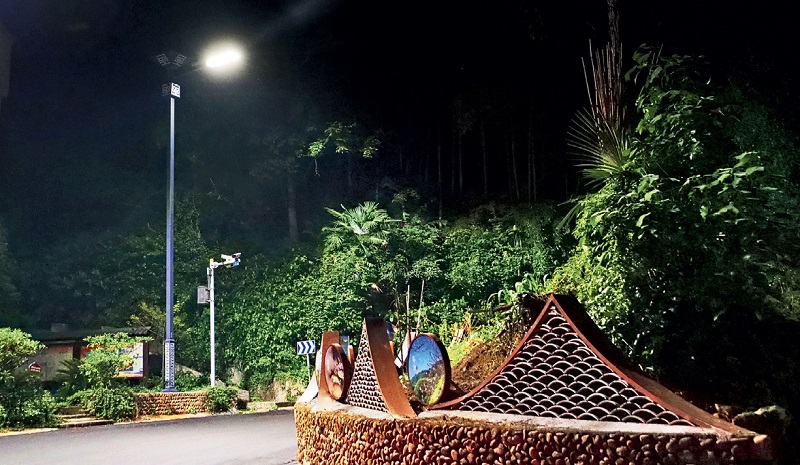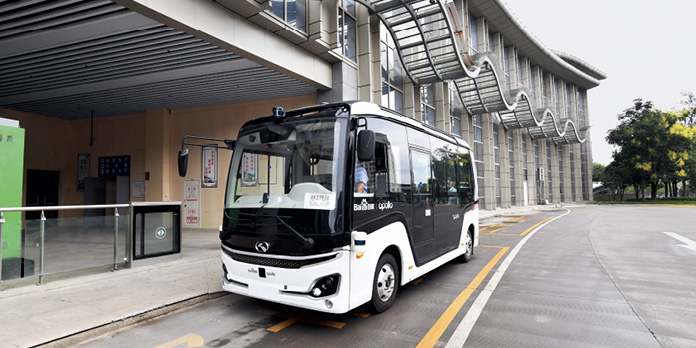A county piloting intelligent transport shows how a new industry worth billions of yuan can be developed, while protecting the environment and supporting national economic growth.

Multifunctional solar-powered integrated smart streetlights are installed along a road in Lizhuang Village, Songyang County, Lishui City, Zhejiang Province. Photo courtesy of Songyang County government
When one walks inside the Intelligent Transportation Exhibition Hall in Songyang, a county in east China’s Zhejiang Province piloting intelligent transportation development, not surprisingly, instead of a conventional guide one is greeted by a Xiaodu robot, an artificial intelligence-powered robot created by technology company Baidu, to explain the development of intelligent transportation in the county. The hall is Songyang’s collaborative innovation base, demonstrating future intelligent transport application scenarios such as 5G tele-chauffeurs, autonomous bus rides, and digital highways. Boasting several leading intelligent transportation companies, Songyang is promoting the development of the transportation sector with its theme “transportation promotes common prosperity.”
Autonomous Driving for Economic Growth
In Songyang, one can often come across smart buses running on designated stretches with only one security guard on board. Select the route on the control console, click on “Start” and the bus begins moving on its own. Its average speed is about 30 km/h with an endurance mileage of over 200 km and it can carry up to 12 passengers.
Tao Chunsheng, deputy director of the Songyang County Transportation Bureau, says two of these autonomous L4 buses have entered the test phase, and their safety performance has been good. The buses have a new intelligent navigation system, which enables them to heed the traffic lights and avoid obstacles on the road. In addition to autonomous buses, Songyang also has autonomous retail vehicles selling food and beverages, distribution vehicles transporting goods, police patrol vehicles for security and even sweepers to clean the roads. Tao says Songyang will introduce more such vehicles for community service by the end of the year.
Autonomous vehicles constitute the quintessential part of Songyang’s intelligent transportation. In recent years, the county has been exploring ways to put them in small and medium-sized application scenarios in the countryside, small and medium-sized cities. To promote autonomous driving and intelligent transportation projects, the Baidu Apollo (Songyang) Ecological Alliance for Intelligent Transportation launched its innovation center in the county on August 25, 2022. So far, 23 companies in the sector have stationed at the center.
“Songyang’s ecological and industrial environment is excellent. We hope to make the center an incubation base for Songyang’s intelligent transportation sector,” said Yu Minfeng, general manager of the Baidu Apollo (Songyang) innovation center. Tao pointed out the center’s important role in providing local employment and promoting common prosperity between urban and rural areas: “With the progress of autonomous driving, many local auto parts industries have developed, such as vehicle camera and brake pad manufacturers, which has boosted the development of the local materials and technology sector.”

An autonomous bus of the Baidu Apollo Intelligent Transportation Ecological Alliance Innovation Center is tested on a trial operation in Songyang County, Lishui City, Zhejiang Province. Yu Xiangjun
 Smart Streetlights
Smart StreetlightsMultifunctional smart streetlights and warning systems are boosting intelligent transport. For example, a stretch of the road running between two subdistricts, Wangsong and Beishan, has 220 equidistantly installed streetlights on both sides using solar power and fitted with digital radars for road surveillance. In addition, the Internet of Things and blockchain technology are being used on a trial basis to maintain the digital and smart highways and improve traffic flow and safety.
The smart streetlights are able to scan the roads to obtain real-time information about the condition of the road surface and relay the information to the intelligent digital management center of the Songyang Transport Bureau. This remote supervision facilitates operations and makes maintenance smarter. This is the first phase of the first digital highway project in the city of Lishui, completed last year and commissioned on an experimental basis.
“In the past, streetlights used optical cables and it was difficult and expensive to lay the cables in the mountainous parts of Songyang. But today’s smart streetlights have chips and use solar energy, which has solved the problem,” said Sun Qinwei, an executive of Zhejiang Chengguanglianlian Technology, a private intelligent transport company that supplied the smart lighting poles. “The main advantage of smart streetlights is their extremely high solar energy conversion rate. They can continue to absorb solar energy even when it is rainy or cloudy,” said Sun. The county experiences about two months of rainy weather but the streetlights still work.
Smart highways have been tested and are being promoted on key stretches of national and provincial roads, rural roads, and mountain roads in the country. “The local authorities have increased their investment in new intelligent transport infrastructure. They are expected to invest RMB 20 million (US $2.7 million) this year, double the amount of last year’s investment, and about 2,000 smart streetlights are planned,” Tao said.
Boosting Industrial Development
On September 6, 18 enterprises from the Zhejiang General Aviation Urban Air Transportation Industry Alliance went to Songyang to discuss multiple application areas of the general aviation industry. Many drone companies showed interest in being part of the county’s intelligent transport project.
“Drones have very obvious advantages for conducting inspections,” Tao said. “Some large culverts and bridges are difficult to access, but thanks to drones, the inspection can be done from multiple angles. Drones have also improved the efficiency of delivery services in Songyang’s industrial parks and campuses.”
By the end of 2022, Songyang had more than 90 transportation enterprises, their output totalling RMB 3.37 billion (US $461 million) and tax revenue exceeding RMB 60 million (US $8.2 million). Intelligent transportation has become a new engine driving local industrial development, instilling vitality to high-quality development of ecological industries in 26 mountainous counties of the whole region.